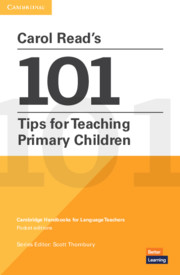Book contents
- Frontmatter
- Contents
- Acknowledgements
- Why I Wrote this Book
- A Getting Started
- B Core Skills
- C Classroom Management
- D Lesson Planning
- E Learning how to Learn
- F Storytelling
- G Playing Games
- H Values Education
- I Songs, Rhymes, Chants and Raps
- J Working with Projects
- K Intercultural Competence
- L Content-Based Learning (CLIL)
- M Thinking Skills
- N Vocabulary
- O Life Skills
- P Art, Craft and Design
- Q Mime and Drama
- R Inclusion and Diversity
- S Creativity
- T Adapting or Writing Materials
- U Listening and Speaking
- V Reading and Writing
- W Multiliteracies
- X Grammar
- Y Assessment
- Z The Last Word
- Glossary
- Selected Further Reading
- Index
G - Playing Games
Published online by Cambridge University Press: 28 October 2023
- Frontmatter
- Contents
- Acknowledgements
- Why I Wrote this Book
- A Getting Started
- B Core Skills
- C Classroom Management
- D Lesson Planning
- E Learning how to Learn
- F Storytelling
- G Playing Games
- H Values Education
- I Songs, Rhymes, Chants and Raps
- J Working with Projects
- K Intercultural Competence
- L Content-Based Learning (CLIL)
- M Thinking Skills
- N Vocabulary
- O Life Skills
- P Art, Craft and Design
- Q Mime and Drama
- R Inclusion and Diversity
- S Creativity
- T Adapting or Writing Materials
- U Listening and Speaking
- V Reading and Writing
- W Multiliteracies
- X Grammar
- Y Assessment
- Z The Last Word
- Glossary
- Selected Further Reading
- Index
Summary
Games provide a wide-ranging, flexible resource for developing children's language. Games promote natural communication and interaction and provide variety in mood, pace, skills, interaction patterns and physical movement. The same game can also often be played using different language and vocabulary with different ages and levels.
Many activities in primary have a game-like quality, for example, when you gradually reveal flashcards and children guess the words. However, games are different from other activities. Games have rules that need to be followed for the game to work fairly and successfully, and children are often more willing to follow the rules of games than they are other rules. Games also have goals, which give a purpose for using language and take the focus away from practising language for its own sake. Games also involve some kind of contest and may be competitive or cooperative. Winning a game, or attaining the goal of a game, may be the result of skill or chance or, most likely, a combination of both. Above all, games are fun.
I’ve had some of my best teaching moments when playing games with primary children. There's nothing more satisfying than being on the sidelines in a class full of children engrossed in autonomously playing a game using language you’ve taught them. On the other hand, games can also be divisive and lead to over-excitement and even aggression, if you don't set them up and manage them with care.
My key tips for playing games are:
25 Competitive or cooperative?
26 Have games up your sleeve!
27 Use games to practise all skills.
28 Minimise the management risks
25 Competitive or cooperative?
Competitive and cooperative games have different benefits and drawbacks. However, it is often possible to set up games in a way that make the most of both.
Competitive games involve a contest between players. There is a winner and one or more losers. Examples of competitive games include board games and memory games. Competitive games generate enthusiasm and are motivating for many children. They reflect how real life works and provide opportunities for success. They also help children learn that ‘a game is only a game’ and to accept the outcome calmly. At the same time, some children always seem to either win or lose at competitive games. This can be demoralising, particularly for younger children.
Cooperative games involve a contest between players and a goal.
- Type
- Chapter
- Information
- Carol Read’s 101 Tips for Teaching Primary Children , pp. 31 - 35Publisher: Cambridge University PressPrint publication year: 2020



